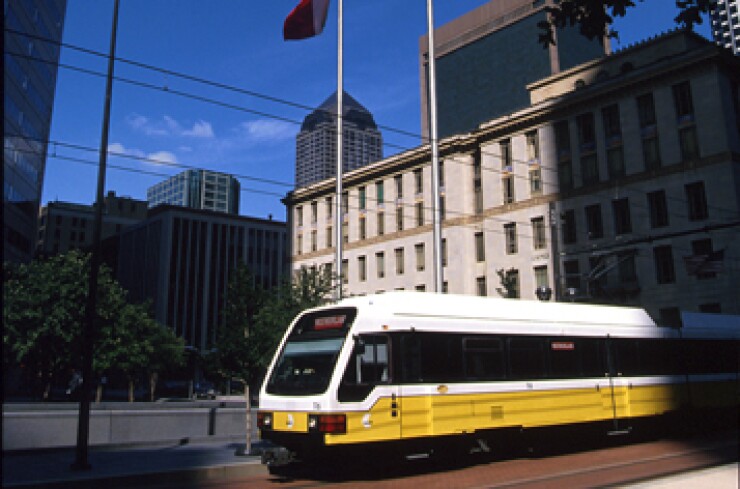
DALLAS – Dallas Area Rapid Transit expects savings of $47 million or 9% net present value when it refunds $483 million of 2008 bonds, officials said.
"We're anticipating strong demand from the buy side," said DART treasurer Dwight Burns. "Rates remain favorable for us on the long end."
The negotiated deal is scheduled for Thursday, Feb. 4, led by Morgan Stanley vice president Sewon Kim with 12 co-managers.
Ron Davis, vice president at First Southwest Co., and David Gordon, managing director at Estrada Hinojosa & Co., are DART's financial advisors.
Because the deal is an advance refunding, DART must watch for negative arbitrage issues, but the rates are working out favorably, said Joe Costello, DART senior vice president for finance.
The agency's credit ratings were affirmed at Aa2 by Moody's Investors Service and AA-plus by Standard & Poor's with stable outlooks. Fitch Ratings does not rate this deal but has a AA rating on outstanding bonds.
The bonds are backed primarily by a 1% sales tax in DART's service area, though farebox revenues are also pledged.
"Because DART relies on sales tax revenues to support operations, we believe it would be unlikely that farebox revenues would be available for debt service if sales tax collections declined below the level of required debt service payments and, therefore, rate to the strength of the sales tax pledge," S&P analyst Jennifer K Garza wrote.
Moody's analyst John Lombardi noted that "DART's dedicated sales tax has grown strongly over its history but is particularly volatile during economic downturns."
Although the sales tax revenue has grown by an average annual rate of 3.9% over the past 20 years, it declined for three consecutive years starting in fiscal 2001. The first 10 years of the new millennium came to be known as the "lost decade" because of the flat revenue growth.
"The tax was similarly sensitive during the most recent economic downturn," Lombardi added. "Positively, sales tax collections have recovered more rapidly than in previous years of economic decline."
DART's service area includes 13 municipalities, including the cities of Dallas, Irving, Plano, Richardson, and Addison. The approximately 700-square-mile service area serves about 2.3 million people in Dallas and Collin counties.
"The DART service area economy is fundamentally strong, and we expect healthy growth to continue in the long-term," Lombardi said.
While the Dallas-Fort Worth area has benefitted from production of oil and gas in the Barnett Shale, the economy has shown little impairment from the decline in oil prices since June 2014.
Employment in the region remains favorable relative to US averages with unemployment at 4% in November 2015 compared to 5% nationally, analysts said. Per capita personal income in the Dallas area also is stronger than the nation, at 108% of the U.S. level based on the most recent figures available.
"The stable outlook reflects our expectation that, while pledged revenues will continue to fluctuate with economic cycles and debt issuance, the service area's broad and diverse tax base will likely continue to provide strong debt service coverage," Garza wrote. "In addition, the outlook reflects our expectation that the system will issue debt in accordance with its current bonding program."





